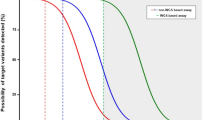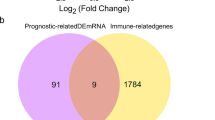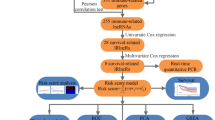Abstract
Background
This study aimed to investigate the role of long noncoding RNA (LncRNA) expression profiles to predict relapse and 5-FU response in patients with stage I/II colon cancer (CC).
Methods and Results
The expression level of 15 LncRNA was analyzed in stage I/II colon tumors of 126 CC patients. To confirm the findings in-vitro, 5FU-resistant HT29 cells were generated by subjecting HT-29 cells to the increasing concentrations of 5FU for 6 months. The 5FU resistance was observed in WST-1 and Annexin V analyses. The colony formation and wound healing assays were assessed to determine the metastatic properties of the cells. Expression levels of LncRNAs and mRNA of EMT-related genes were determined by RT-PCR. The role of LncRNA on metastasis and 5FU sensitivity were confirmed in pcDNA3.0-PTENP1 and si-MALAT1 expressed 5FU-resistant HT29 cell lineages.
Results
High MALAT1 (p = 0.0002) and low PTENP1 (p = 0.0044) expressions were significantly associated with 5-FU resistance and tumor relapse in stage I/II CC. The invasiveness and colony-forming characteristics of 5-FU-resistant cell lineages were higher as compared to the parent HT-29. Moreover, the expression of MALAT1 (p = 0.0009) was increased while the expression of PTENP1 (p = 0.0158) decreased in 5FU-resistant-HT-29 cells. Si-MALAT1 treatment increased cell sensitivity to 5FU, whereas it decreased invasive behaviors of 5 FU-resistant-HT-29 cells.
Conclusion
MALAT1 may be a biomarker in predicting recurrence in early-stage CC. Our findings suggest that a cell-based therapy to target MALAT1 could be established for these patients to prevent metastasis and 5-FU resistance.





Similar content being viewed by others
References
Siegel R, Miller KD, Fedewa SA, Ahnen DJ, Meester RGS, Barzi A, Jemal A (2017) Colorectal cancer statistics. CA A Cancer J Clin 67:177–193
Siegel RL, Miller KD, Jemal A (2017) Cancer Statistics CA Cancer J Clin 67:7–30
Han J, Li J, Tang K et al (2017) miR-338-3p confers 5-fluorouracil resistance in p53 mutant colon cancer cells by targeting the mammalian target of rapamycin. Exp Cell Res 360:328–336
Longley DB, Harkin DP, Johnston PG (2003) 5-fluorouracil: mechanisms of action and clinical strategies. Nat Rev Cancer 3(5):330–338
Stintzing S et al (2016) FOLFIRI plus cetuximab versus FOLFIRI plus bevacizumab for metastatic colorectal cancer (FIRE-3): a post-hoc analysis of tumour dynamics in the final RAS wild-type subgroup of this randomised open-label phase 3 trial. Lancet Oncol 17:1426–2143
Chang S, Huang J, Niu H, Wang J, Si Y, Bai Z, Cheng S, Ding W (2020) Epigenetic regulation of osteopontin splicing isoform c defines its role as a microenvironmental factor to promote the survival of colon cancer cells from 5-FU treatment. Cancer Cell Int 20:452
Yaffee P, Osipov A, Tan C, Tuli R, Hendifar A (2015) Review of systemic therapies for locally advanced and metastatic rectal cancer. J Gastrointest Oncol 6:185–200
Qi P, Du X (2013) The long non-coding RNAs, a new cancer diagnostic and therapeutic gold mine. Mod Pathol 26:155–165
Gong R, Jiamg Y (2020) Non-coding RNAs in pancreatic ductal adenocarcinoma. Front Oncol 10:309
Wang CJ, Shi SB, Tian J, Xu J, Niu ZX (2017) lncRNA MALAT1, HOTTIP, and PVT1 as predictors for predicting the efficacy of GEM based chemotherapy in first-line treatment of pancreatic cancer patients. Oncotarget 8:95108–95115
Gang L, Lv L (2019) Long non-coding RNA H19 regulates cell growth and metastasis via the miR-22-3p/Snail1 axis in gastric cancer. Int J oncol 54(6):2157–2168
Yan B, Wubuli A, Liu Y, Wang X (2018) Long non-coding RNA phosphatase and tensin homolog pseudogene 1 suppresses osteosarcoma cell growth via the phosphoinositide 3-kinase/protein kinase B signaling pathway. Exp Ther Med 15(6):4829–4837
Dong H, Hu J, Zou K, Ye M, Chen Y, Wu C, Chen X, Han M (2019) Activation of LncRNA TINCR by H3K27 acetylation promotes Trastuzumab resistance and epithelial-mesenchymal transition by targeting MicroRNA-125b in breast Cancer. Mol Cancer. https://doi.org/10.1186/s12943-018-0931-9
Wang XJ, Zeng B, Lin S, Chen M, Chi P (2019) An integrated miRNA-lncRNA signature predicts the survival of stage II colon cancer. Ann Clin Lab Sci 49(6):730–739
Wang M, Han D, Yuan Z, Hu H, Zhao Z, Yang R, Jin Y, Zou C, Chen Y, Wang G, Gao X, Wang X (2018) Long non-coding RNA H19 confers 5-Fu resistance in colorectal cancer by promoting SIRT1-mediated autophagy. Cell Death Dis 9(12):1149
Yang C, Pan Y, Deng SP (2019) Downregulation of lncRNA CCAT1 enhances 5-fluorouracil sensitivity in human colon cancer cells. Mol Cell Biol 20:9
Kim AY, Kwak JH, Je NK, Lee Y, Junk YS (2015) Epithelial-mesenchymal transition is associated with acquired resistance to 5-fluorocuracil in HT-29 colon cancer Cells. Toxicol Res 31(2):151–156
Blondy S, David V, Verdier M, Mathonnet M, Perraud A, Christou N (2020) 5-Fluorouracil resistance mechanisms in colorectal cancer: From classical pathways to promising processes. Cancer Sci 111(9):3142–3154
Du B, Shim JS (2016) Targeting epithelial-mesenchymal transition (EMT) to overcome drug resistance in cancer. Molecules 21(7):965
Mitra A, Mishra L, Li S (2015) EMT, CTCs and CSCs in tumor relapse and drug-resistance. Oncotarget 6(13):10697–10711
Lai Y, Li J, Zhong L, He X, Si X, Sun Y, Chen Y, Zhong J, Hu Y, Li B, Liao W, Liu C, Liao Y, Xiu J, Bin J (2019) The pseudogene PTENP1 regulates smooth muscle cells as a competing endogenous RNA. Clin Sci (Lond) 133(13):1439–1455
Yu G, Yao W, Gumireddy K et al (2014) Pseudogene PTENP1 functions as a competing endogenous RNA to suppress clear-cell renal cell carcinoma progression. Mol Cancer Ther 13(12):3086–3097
Gharib E, Nazemalhosseini-Mojarad E, Baghdar K et al (2021) Identification of a stool long non-coding RNAs panel as a potential biomarker for early detection of colorectal cancer. J Clin Lab Anal 35(2):e23601
Zheng HT, Shi DB, Wang YW, Li XX, Xu Y, Tripathi P, Gu WL, Cai GX, Cai SJ (2014) High expression of lncRNA MALAT1 suggests a biomarker of poor prognosis in colorectal cancer. Int J Clin Exp Pathol 7(6):3174–3178
Ji Q, Liu X, Fu X, Zhang L, Sui H, Zhou L et al (2013) Resveratrol inhibits invasion and metastasis of colorectal cancer cells via MALAT1 mediated Wnt/ b-catenin signal pathway. PLoS ONE 8:e78700
Wei Y, Niu B (2015) Role of MALAT1 as a prognostic factor for survival in various cancers: a systematic review of the literature with meta- analysis. Dis Markers 6:164635–164639
Cai T, Liu Y, Xiao J (2018) Long noncoding RNA MALAT1 knock- down reverses chemoresistance to temozolomide via promoting microRNA-101 in glioblastoma. Cancer Med 7(4):1404–1415
Gong WJ, Yin JY, Li XP et al (2016) Association of well-characterized lung cancer lncRNA polymorphisms with lung cancer susceptibility and platinum-based chemotherapy response. Tumour Biol 37(6):8349–8358
Li P, Zhang X, Wang H et al (2017) MALAT1 is associated with poor response to oxaliplatin-based chemotherapy in colorectal cancer patients and promotes chemoresistance through EZH2. Mol Cancer Ther 16(4):739–751
Zhang Z, Zheng Q, Liu Y, Sun L, Han P, Wang R, Zhao J, Hu S, Zhao X (2020) Human CD133-positive hematopoietic progenitor cells enhance the malignancy of breast cancer cells. BMC Cancer 20(1):1158
Modi SJ, Kulkarni VM (2020) Discovery of VEGFR-2 inhibitors exerting significant anticancer activity against CD44+ and CD133+ cancer stem cells (CSCs): Reversal of TGF-beta induced epithelial-mesenchymal transition (EMT) in hepatocellular carcinoma. Eur J Med Chem 207:112851
Latorre E, Carelli S, Raimondi I, D’Agostino V, Castiglioni I, Zucal C, Moro G, Luciani A, Ghilardi G, Monti E, Inga A, Di Giulio AM, Gorio A, Provenzani A (2016) The ribonucleic complex HuR-MALAT1 represses CD133 expression and suppresses epithelial-mesenchymal transition in breast cancer. Cancer Res 76(9):2626–2636
Fan C et al (2020) Long non-coding RNA MALAT1 regulates oxaliplatin-resistance via miR-324–3p/ADAM17 axis in colorectal cancer cells. Cancer Cell Int 20:473
Radwan AF et al (2021) Association of MALAT1 and PVT1 Variants, Expression Profiles and Target miRNA-101 and miRNA-186 with Colorectal Cancer: Correlation with Epithelial-Mesenchymal Transition. Int J Mol Sci 22:6147
Tang D, Yang Z, Long F, Luo L, Yang B, Zhu R, Sang X, Cao G (2019) Inhibition of MALAT1 reduces tumor growth and metastasis and promotes drug sensitivity in colorectal cancer. Cell Signal 57:21–28
Xu WW, Jin J, Wu XY, Ren QL, Farzaneh M (2022) MALAT1-related signaling pathways in colorectal cancer. Cancer Cell Int 22(1):126
Tang D, Yang Z, Long F, Luo L, Yang B et al (2019) Inhibition of MALAT1 reduces tumor growth and metastasis and promotes drug sensitivity in colorectal cancer. Cell Signal 57:21–28
Funding
This study was funded by the Scientific Research Projects Foundation of the Bursa Uludag University, Bursa, Turkey [Grant number: KUAP(T)-2014/35, KUAP(T)-2015/2 and DDP(T)-2018/3] and the Scientific and Technical Research Council of Turkey (TUBITAK) under Grant No.318S256.
Author information
Authors and Affiliations
Corresponding author
Ethics declarations
Conflict of interest
The authors have not disclosed any competing interests.
Ethical approval
All procedures performed in studies involving human participants were in accordance with the ethical standards of the institutional and/or national research committee and with the 1964 Helsinki declaration and its later amendments or comparable ethical standards (2014-12/16).
Additional information
Publisher's Note
Springer Nature remains neutral with regard to jurisdictional claims in published maps and institutional affiliations.
Rights and permissions
About this article
Cite this article
Ak Aksoy, S., Tunca, B., Erçelik, M. et al. Early-stage colon cancer with high MALAT1 expression is associated with the 5-Fluorouracil resistance and future metastasis. Mol Biol Rep 49, 11243–11253 (2022). https://doi.org/10.1007/s11033-022-07680-y
Received:
Accepted:
Published:
Issue Date:
DOI: https://doi.org/10.1007/s11033-022-07680-y




